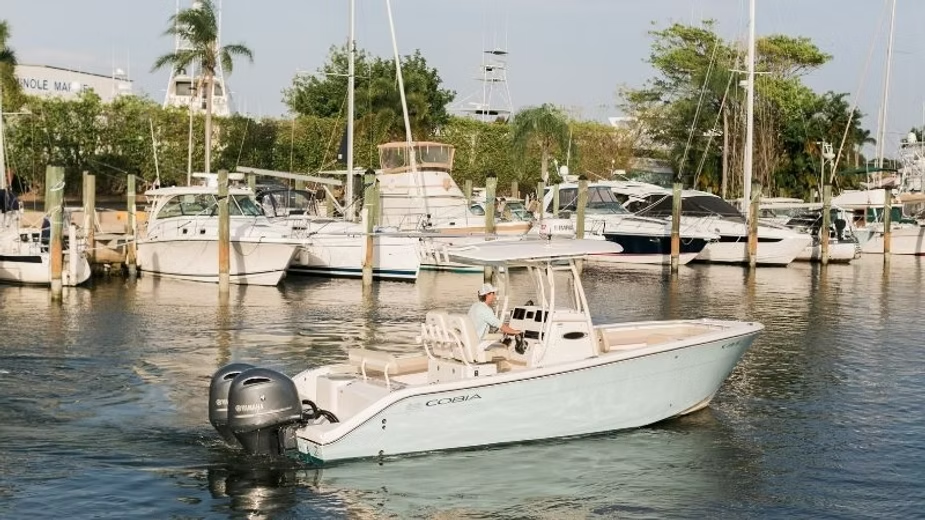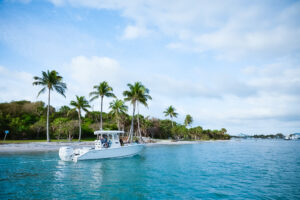
Our 26′ Cobia in Palm Beach Gardens, FL
Spending a day on the open water? Boating is a wonderful recreational activity, but before you go, it’s important to learn some basic terminology. It will help keep you safe in case of an emergency. With a little preparation, you’ll feel more comfortable on your excursion. Here are twelve useful boating terms for beginners and nautical vocabulary that you should know.
1. Starboard
You’ve probably heard the term, “starboard side”, but what does it mean? If you are standing at the front of the boat, the starboard is on the right side. Fun fact: at night, there are green lights on the starboard side, and red lights on the port side to let other boats know which direction you are facing.
2. Port
This is another front-of-boat term. When facing forward, port means the left side of the boat. When two boats are about to meet on the water, they should pass each other “port side to port side” since it is a maritime boating rule.
3. Bow and Stern
Speaking of the front of the boat, that’s called the bow. The back of the boat is the stern. When you move towards the bow, it’s called “forward” and when you go towards the stern, it’s called “aft”.
4. Helm
The helm is where you steer the boat. It could have a big classic steering wheel, or something called a tiller. A tiller is a long, stick-like apparatus that connects to the rudder and helps control direction.
5. Aft
When you are moving towards the back of the boat, or going “aft.”
6. Forward
When you are moving towards the front of the boat, or going “forward.”
7. Underway
When the boat is moving by motor or wind, the boat is “underway”
8. Trim Tabs
Trim tabs lift the boat on either side in order to compensate for weight distribution or water conditions. Trim tabs can be used on the port side or starboard side.
9. Mayday
This is an important one since it is an international distress call. Should an emergency arise, get on the radio and use this term if it is a life-threatening situation.
10. Abandon Ship
When the boat is in imminent danger, this term will be used. In the event that you must abandon ship, make sure that you are wearing your Personal Flotation Device (PFD) or life jacket before leaving the vessel.
11. Wake
When in motion, the boat disturbs the surface of the water a creates a column behind it. This is called the wake. Wake from a large boat can create rough conditions for a smaller boat that crosses that path.
12. Capsize
When a boat capsizes, it means that it flips over. This can be caused by turning too sharply or being upset by a wave. If your boat capsizes, don’t panic and try to swim to shore. Stay with the boat, unless otherwise directed–many boats will right themselves on their own.
Other Fun Phrases
Did you know that many expressions that we use in everyday life actually have nautical origins? By learning a few of these bonus phrases, it can help you with your boating knowledge, too.
High and Dry
If you’ve accidentally “beached” your boat, or run it on the ground then you are “high and dry”. Many folks use this expression casually to mean that they are stuck in a bad situation.
Under the Weather
In everyday life is used to indicate that you are feeling poorly. But in boating, it refers to going below deck to escape storms. Rather than being outside in the elements, you’d go “under the weather” where it was nice and dry.
Use Your Boating Terms at a Boat Club
If you’ve enjoyed learning about boat vocabulary, why not go beyond the boating experience? Joining a boat club is a wonderful way to get more practice and use your new nautical language skills. There are so many benefits that include not just boat rentals, so it’s worth checking out.
Ready To Go Boating?
Now that you’ve done your homework, you can feel confident about going on a boat. These boating terms will help make for an enjoyable and safe outing. Don’t be afraid to ask about any new ones that come up while you are on the boat, too.
And this could be just the start of your nautical journey. If you would like to join us at the Gulfstream Boat Club contact us here.
#BoatTerms #BoatRentals #BoatLingo #BoatSafety #BoatingTips


